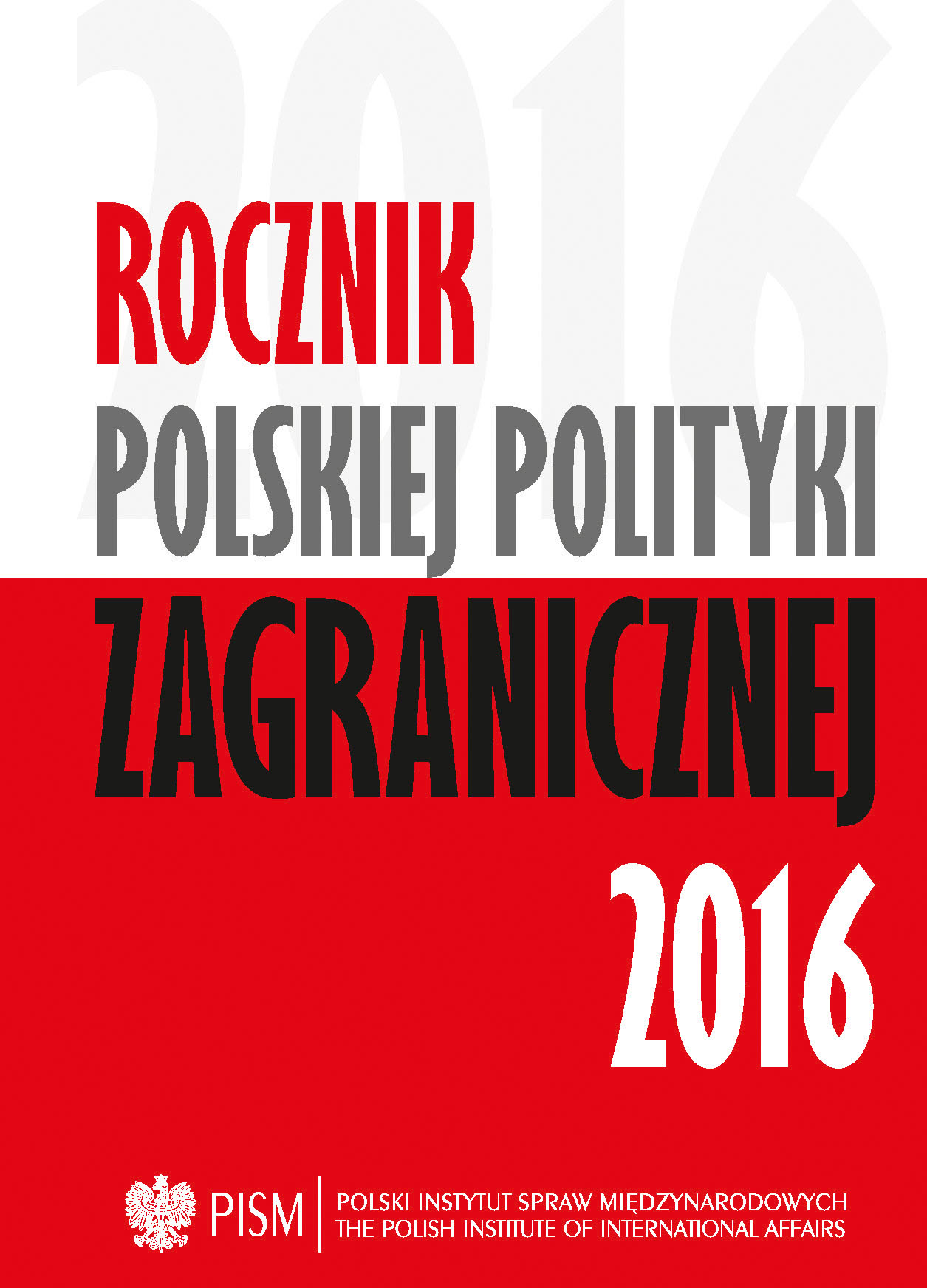
We kindly inform you that, as long as the subject affiliation of our 300.000+ articles is in progress, you might get unsufficient or no results on your third level or second level search. In this case, please broaden your search criteria.

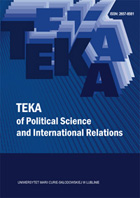
This article presents the issues of legitimacy, particularly concerning the global reality of the institution of power in the context of present-day conditions of international politics, with particular emphasis on fragile states functioning mainly in the area of the contemporary “Third World”. The legality and legitimacy of power analyzed here undoubtedly have significant implications for the internal politics of fragile states, regional good neighborly relations, and international politics, particularly in the context of the global security strategy. This article examines the above issues primarily in the context of policy theory. As a result, several research questions arise: to what extent and how does legitimacy affect the effectiveness of the political strategies used by the authorities? Are other factors and stimulators of political commitment also taken into account? What is the importance of legitimacy in the context of the complex conditions of the politically and economically ineffective fragile state? Is legitimacy, apart from the moral and ideological dimension, significant in the destabilized reality of the weak political and economic structures of a failing state? The analysis, in this way, makes it possible to interpret and present many important factors for which the concept of the legitimacy of power plays a significant role in reflecting on the geopolitical determinants of fragile states in contemporary international relations.
More...
The aim of the article is to analyze the conditions and various dimensions of military cooperation between China and Latin American countries in the twenty-first century. The article consists of three parts. First of all, the author outlines Sino-Latin American relations in a broader perspective, presenting the conditions and goals of the Chinese presence in Latin America and the Caribbean and synthetically discussing the most important areas of political and economic cooperation. In the second part, he analyses the conditions and significance of military cooperation, pointing to the factors conducive to the development of cooperation, what is more, he motives and role of China’s military diplomacy in the Latin American region. In the third part, there are presented the most important forms of cooperation. The author focused on defense ministers’ and military commanders meetings, training, joint exercises and arms trade. The author’s priority goal is to show the evolution of military cooperation between the Middle Kingdom and Latin America and its importance for the balance of power in the region.
More...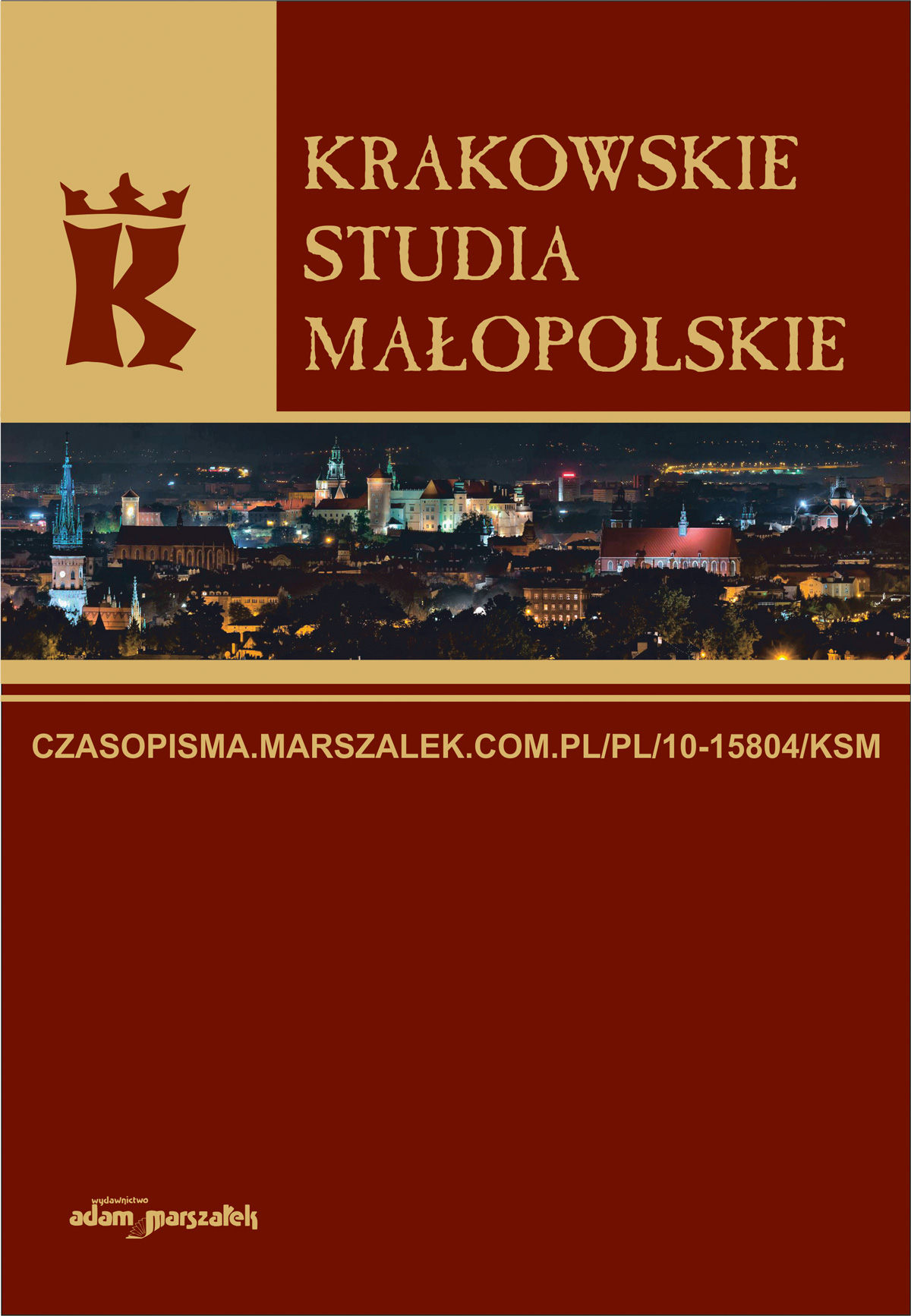
The intensification of Russia-Myanmar relations has been one of the the unexpected consequences of Russo-Ukrainian war. For Russian Federation Burma/ Myanmar used to be a secondary partner, important only due to being the major client of the military-industrial complex. Global (semi)isolation of Russia changed these calculations, upgrading the importance of Myanmar in Russia’s foreign policy. For Naypyidaw these relations have been important since the last coup (1 February 2021), in the aftermath of the putsch Moscow became the biggest international protector of Burmese generals. Due to these two reasons Russia-Myanmar relations have reached the unprecedented high level, unseen in history of this bilateral relations.
More...
After the collapse of the Soviet Union into 15 independent states in December 1991, including the Russian Federation, there was a real opportunity to reset relations between Moscow and Islamabad. The Russian Federation did not take advantage of the new geopolitical situation to significantly improve mutual relations in the last decade of the twentieth century. However, in the first two decades of the twenty-first century, there was an intensification of political, economic and military relations between the two countries, which fluctuated. The author focused in the article on the premises that underline the improvement of mutual relations in these three areas. The premises that have inhibited and inhibit more intensive cooperation, especially in the political and economic fields, were also presented. In the end was formulated a few conclusions.
More...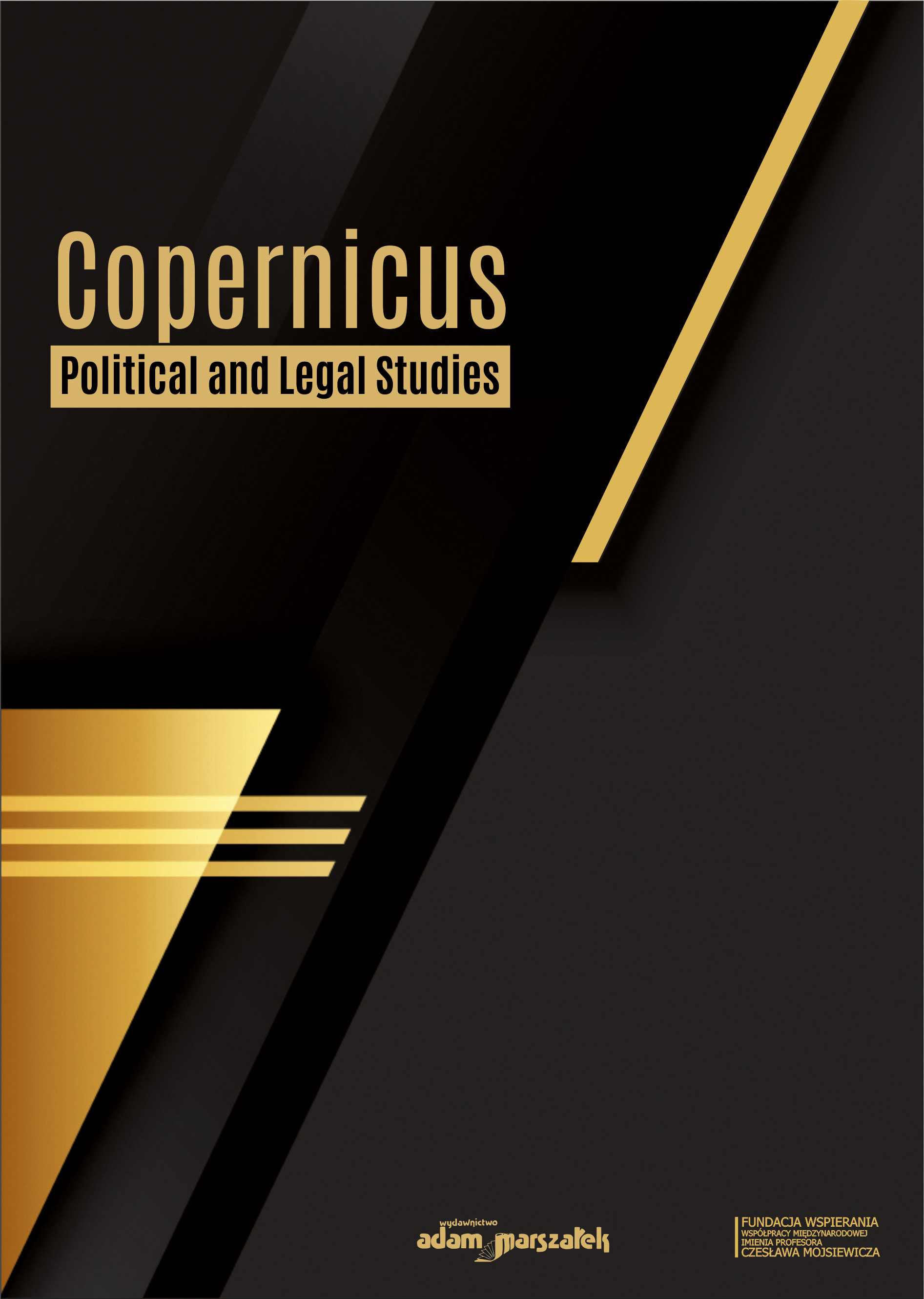
Under the current conditions of expanding globalization, the role of cross-border cooperation in the life of regions and communities is growing and new opportunities are opening up to intensify economic activity in peripheral areas and increase their competitiveness. Cross-border cooperation is aimed at overcoming the negative aspects of the existence of borders and the consequences that have arisen in the border areas due to their location on the national outskirts of states and aims to improve living conditions. Among the main goals of such cooperation are: overcoming existing stereotypes and prejudices on both sides of the border; removing political and administrative barriers between neighboring nations; creation of economic, social and cultural infrastructure, subject to the formation of joint bodies, economic entities, centers, etc. The article describes the main aspects of cross-border cooperation between Romania, Moldova and Ukraine. Romania is an important partner for the countries of Eastern Europe and, as one of the youngest EU countries, has considerable experience that could help partner countries to carry out effective socio- economic reforms and fight corruption. Ukraine-Romania- Moldova cross-border cooperation is part of the European Neighborhood and Partnership Instrument and plays an important role in developing mutually beneficial relations between states, addressing socio-economic, environmental and security issues, and is an effective means of Ukraine’s European integration. The Joint Action Plan “Ukraine-Romania- Moldova” 2007–2013 of the European Instrument has significantly affected the revival of cross-border cooperation between Ukraine, Romania, Moldova, especially the cooperation of local and regional authorities, communities and civil society institutions. During the program, more than 140 projects were implemented, which contributed to the development of transport infrastructure in border areas, energy networks, water and waste management, funded projects for cooperation between universities, research institutes and local authorities. There are positive dynamics of cross-border cooperation between Ukraine and Romania, in particular, important infrastructure projects are being implemented under the “Joint Black Sea Basin Joint Operational Program 2014–2020” and EU Joint Operational Program Romania-Ukraine 2014–2020”.
More...
The purpose of this article is to explore the multi-faceted dynamics of interest groups in the process of shaping Germany’s foreign policy toward China. The analysis focuses on understanding the role ofvarious interest groups and their influence on decision-making, as well as showing the complexity and implications of this influence in the context of a democratic society. The main thrust of the text is to understand how various interest groups in Germany influence its foreign policy toward China, particularly in the context of mutual economic benefits and the development of political relations. The study focuses on identifying key interest groups and analysing the mechanisms and implications of their impact on decision-making processes. The text poses several research hypotheses: 1) interest groups, such as business associations, research institutes and think tanks, the mass media and the general public, as well as the Chinese diaspora in Germany, play a significant role in shaping Germany’s foreign policy towards China; 2) the mechanisms of interest groups’ influence stem from their ability to channel social interests into the political system and take advantage of institutional opportunities for participation; 3) the varying distribution of power among competing interest groups in Germany, may be explained by indicating that power is not concentrated within a small privileged elite but is rather fragmented among different groups. The role of expert knowledge, the importance of the Chinese diaspora and the interest of the public and the media are all significant factors. The article uses literature analysis and qualitative research based on expert interviews with academics,researchers, think tank representatives, and government officials. These interviews provide valuable information on the mechanisms of interest groups’ effect on German foreign policy.The article demonstrates that interest groups play an important role in shaping Germany’s foreign policy toward China and that this influence results from their capacity to represent public interestsand take advantage of institutional opportunities for participation, which is consistent with the liberal paradigm of international relations. A pluralist perspective on analysis emphasizes the importance of competitive politics and citizen participation in decision-making processes. Maintaining democratic integrity and transparency in Germany’s international operations requires an understanding of these complex relationships.
More...
The article focuses on the analysis of the attitude of Germany towards Russia as an example of political adaptation. The paper’s aim is to verify the hypothesis that Germany’s attitude towards Russiais characterized by a political adaptation process, which means that Germany strives to adjust to the changes in the regional environment as well as influence it. The author attempts to answer the following question: What strategies of political adaptation were adopted between 2005 and 2021? The article is divided into several parts. In the first one (apart from the introduction), the authordiscusses the concept of political adaptation. The second part focuses on describing German-Russian relations before 2005. Subsequent parts analyse the period between 2005 and 2021. The author emphasizes the turning points of 2008 and 2014. The last section is a summary and forecast for the coming years. The article was prepared on the basis of official documents, speeches and actions of politicians,press materials and analyses.
More...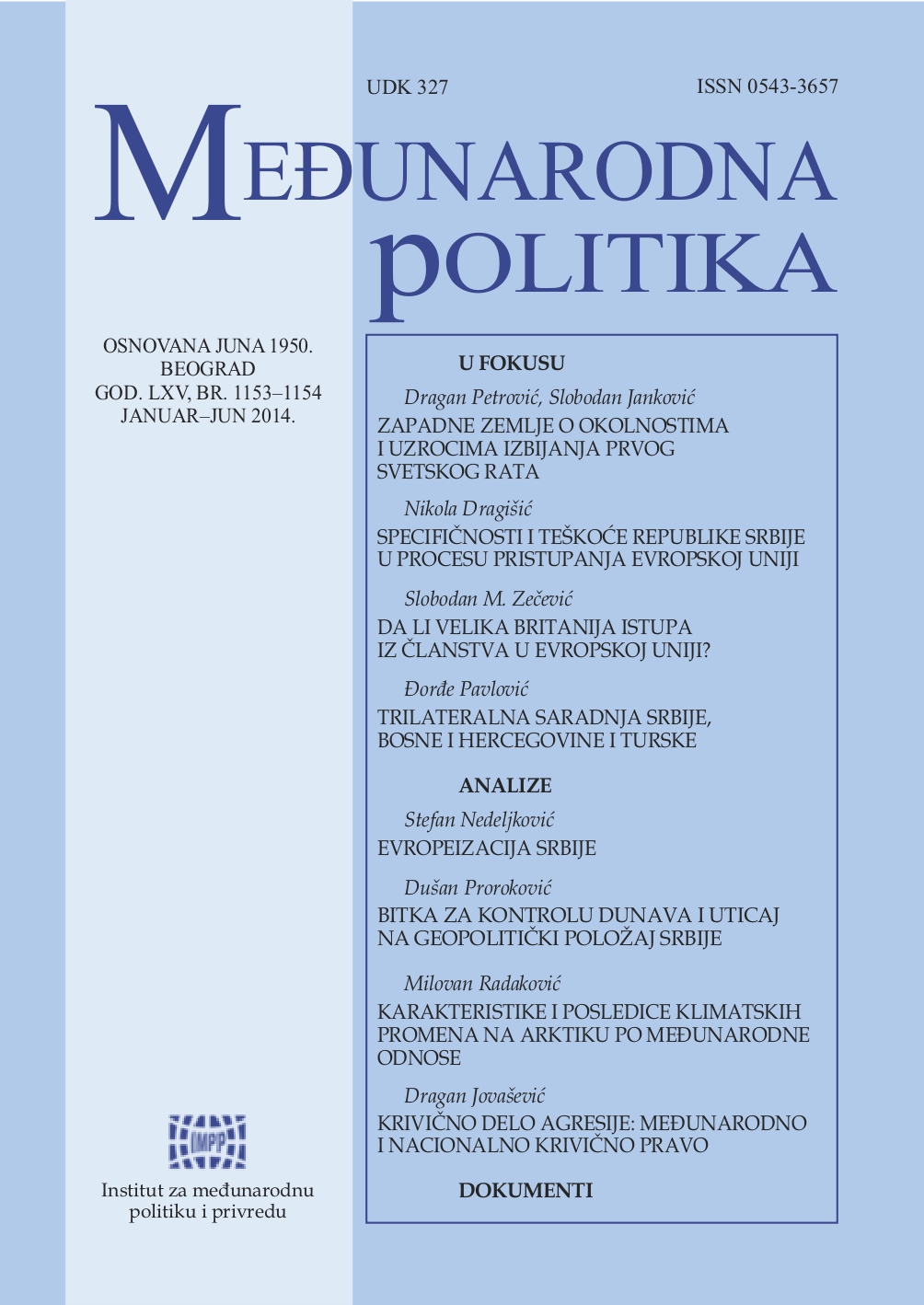
In this paper, the author analyses trilateral cooperation among Serbia, Bosnia and Herzegovina and Turkey in the past four years as a special contemporary form of multilateral cooperation of the Balkan countries. As this process has brought many results and has had its own institutional mechanisms, the paper is divided in five parts. The foreign policy context of cooperation among these three countries is shown in the first part of this paper, while the second one is dedicated to the presentation of institutional mechanisms of cooperation. Results of this process are shown in the third part of the paper, reactions to the trilateral in the fourth, and future perspectives of this cooperation are presented in the last part.
More...
In this paper, the authors try to diagnose the fundamental aspects, scopes and the extent of the international community’s commitment in building of the modern Afghan state and society in line with the objectives of the major subjects of international relations. The focus is on the activities of the United Nations (UN) and the NATO, but in a broader context also on China, Russia and the EU. In this sense, the central point of the analysis are the objectives related to development and establishment of a stable system of political institutions and the effective implementation of public policies as well as military, police and other institutional capacities with security responsibilities in order to create the preconditions for possible gradual economic development of Afghanistan and normal life conditions. The authors conclude that the international military and civilian missions have failed in the achievement of political objectives, while the security objectives have been attained to a lesser extent
More...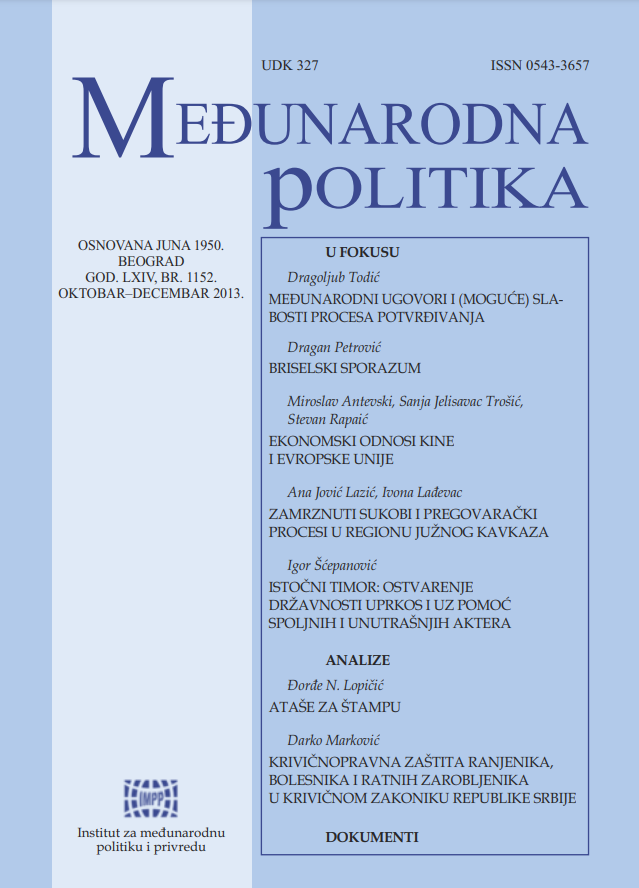
The article studies the institution of press attaché in diplomacy since it was created in the 19th century up to the present days. There are very few texts on press attaché in the Yugoslav and Serbian literature. There is only one paper dealing with this subject which was published in distant 1940, so this topic has not been studied and explored at all. This is the first attempt in the contemporary Serbian literature to explore the institution of press attaché. After World War II and especially in the contemporary diplomacy press attaché has been a very significant and relevant professional institution in performing diplomatic duties in diplomatic missions abroad. The author has given a short overview of press in general, in the Kingdom of Serbia, the Kingdom of Yugoslavia and in the post-war Yugoslavia presenting diplomats who performed the duties of press attaché. The relationship between press and diplomacy as well as similarities and differences have also been studied.
More...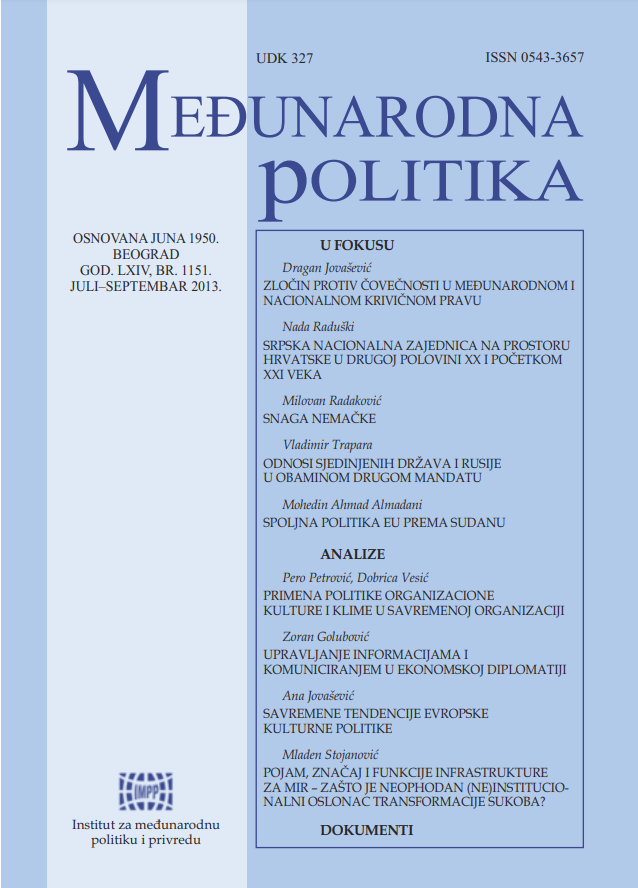
Obama’s first presidential term was marked by both the beginning of the U.S.-Russian “reset“, and its failure. Since spring 2011, most of the positive outcomes of the “reset“have been annulled including the achieved spirit of cooperation. In Obama’s second term, we are witnessing further worsening in relations between the two powers, which is also accompanied by cold personal relations between the two presidents, Obama and Putin. Prospects for the future are pessimistic, at least until the end of Obama’s term. Nevertheless, we cannot talk of a new Cold War in the sense of the previous confrontation between the two superpowers, but rather of the clash of visions of mutual relations and international order, and yet another failed attempt of the U.S.-Russian rapprochement.
More...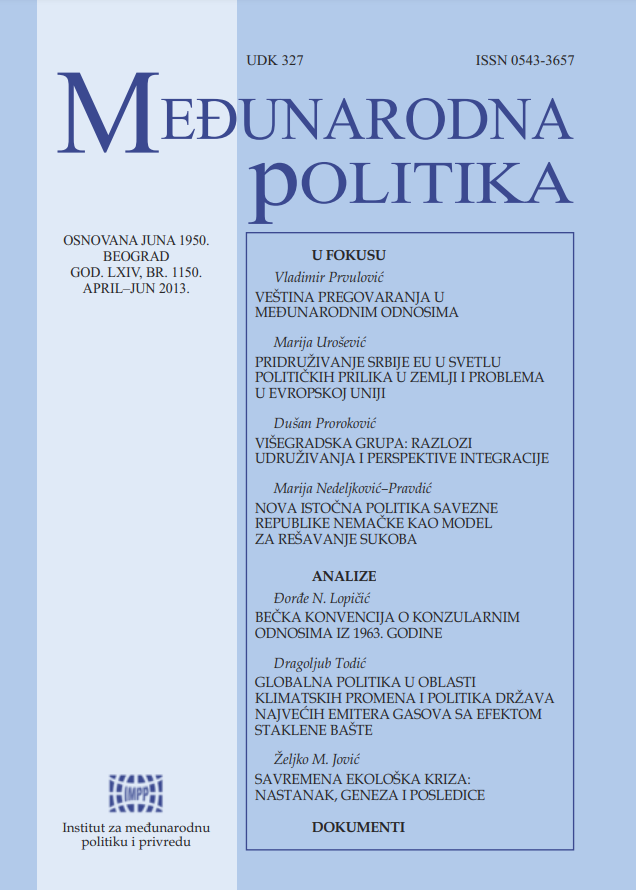
The article analyses the integration of Poland, the Czech Republic, Slovakia and Hungary into the Visegrad Group (VG). Forming of VG helped in keeping stability in this part of the Europe after the fall of the Eastern bloc. Still, its forming was influenced by other, long-term interests of the geostrategic character. Having this in mind, the structure of this article is divided into six parts. In the first, introductory part, the basic data of the member states are presented. The second part deals with the historical roots of instability in the relations between some VG members. The third part is devoted to the economic effects of forming VG and the effects caused by the great economic crisis. The fourth part deals with the geopolitical aspects of forming VG and the US geostrategic interests in Central and Eastern Europe. In the fifth part, we are trying to show the potential future political hot spots: Silesian issue (in Poland), Moravian issue (in the Czech Republic), Slovak-Roma relations and the periodical radicalization of the Hungarian electoral body. The sixth part is the conclusion.
More...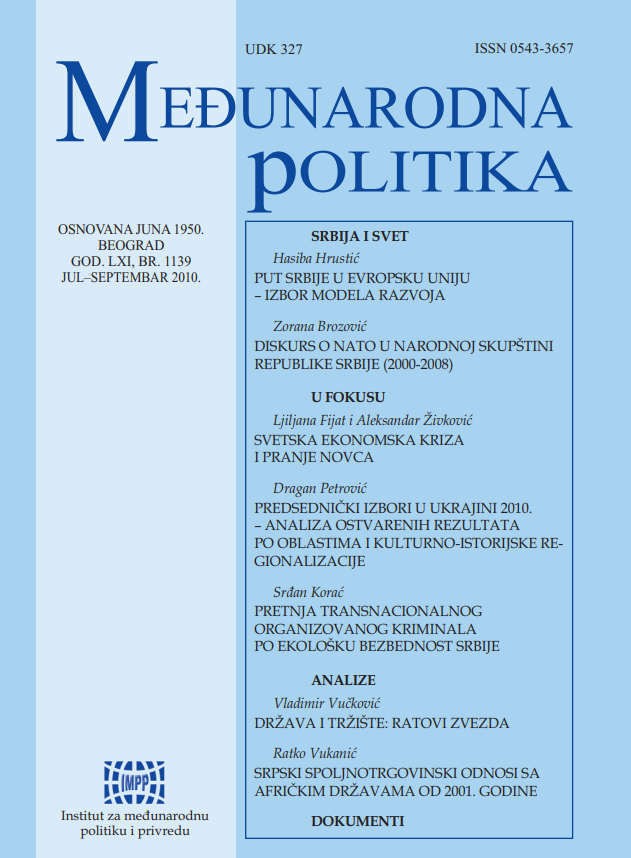
The paper presents an analysis of the main characteristics of Serbia’s foreign trade relations with African states in terms of volume, value, geographic and product structures, the economic feasibility analysis of improving the trade relations with African states and the completion of strategy of increasing exports, which the Government of Serbia adopted in June 2008. African countries since 2001. have a small share in total foreign trade of Serbia, on average 1-2% annually. Republic of Serbia has not concluded a trade agreement neither with African states, nor with the African regional economic communities, African Union or the African Economic Community. But there are long-term agreements on trade and economic cooperation, which former Yugoslavia concluded with some African states that are still in force and guarantee to the contracting parties the most favoured nation treatment. Serbia’s most important trading partners are Egypt, Libya, Tunisia, Morocco and Algeria in North Africa; Kenya, Tanzania, Uganda and the Seychelles in East Africa; Equatorial Guinea, Congo, DR Congo and Cameroon in Central Africa; Nigeria, Ghana and Ivory Coast in West Africa and the Republic of South Africa and Angola in South Africa. The Government strategy envisaged the export increase only to the countries of North Africa, although the increase of export to all five African regions is economically well founded.
More...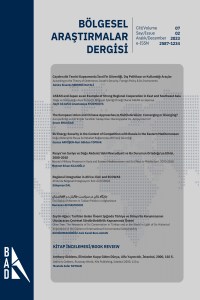
For a long time, the international political system has been recognised as a multilateral space. The actors within this system have different understandings of and approaches to multilateralism. The aim of this study is to examine the positions of the European Union (EU) and China with regard to multilateralism, taking them into account as related actors. The study includes chapters on the concept of multilateralism, the relationship between the EU and China, and European and Chinese perspectives on multilateralism. In the end, the research aims to determine the extent to which the EU and China share a common understanding of the concept of multilateralism.
More...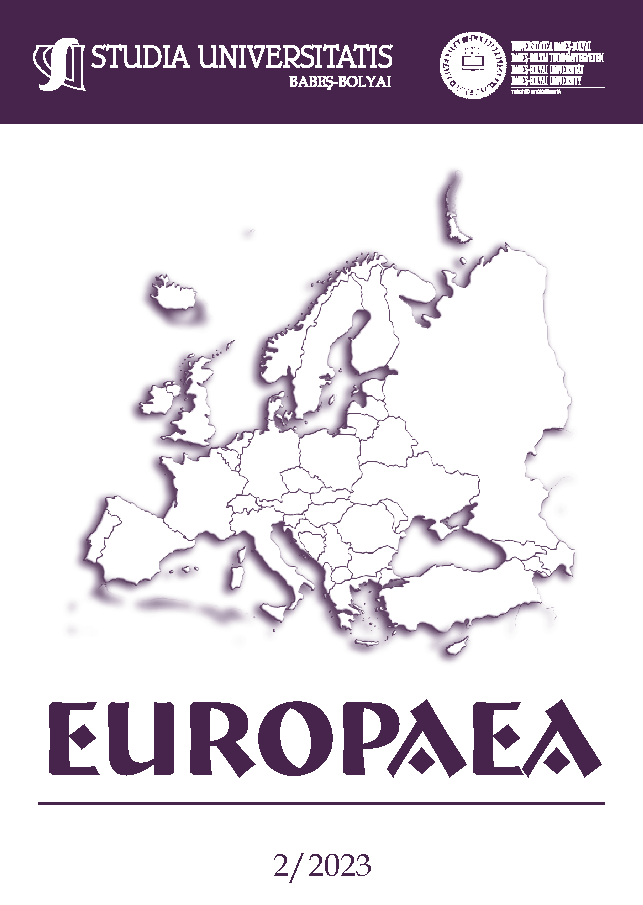
Energy-related issues occupy a central place on the political agenda of the European Union, so it is no wonder that several studies in the field of international relations focus on this EU policy. However, most of them tend to follow the subject from the perspective of the Union's need to cover its energy deficit by identifying new sources of supply, neglecting the issue of promoting sustainable development at the level of its foreign policy. Starting from these considerations, the present study aims to analyse the energy cooperation between the Union and the Kingdom of Morocco, following the instruments through which European officials try to boost renewable energy projects. The research will also highlight the opportunities in terms of achieving the foreign policy objective previously exposed, within the bilateral dynamics between the two actors. In order to assure a comprehensive analysis of the subject, the research will be conducted based on Robert Keohane theories regarding cooperation and international institutions.
More...
The potential of clear hydrogen to develop into a valuable resource in the future is becoming a growingly attractive debate topic, in the context of a targeted decarbonized economy. The present article analyses the interest that institutional and corporate actors in the European Union and the United States dedicate to this subject by assessing the comprehensiveness of the official, governmental communication and that of private actors - focusing on gas transmission companies, either producers or transporters - on the exploitation of clear hydrogen. The aim of the research is to investigate where is currently the most visible attention manifesting and whether public institutions or the private sector are more engaged in bringing about change in the near future in the field of green transition.
More...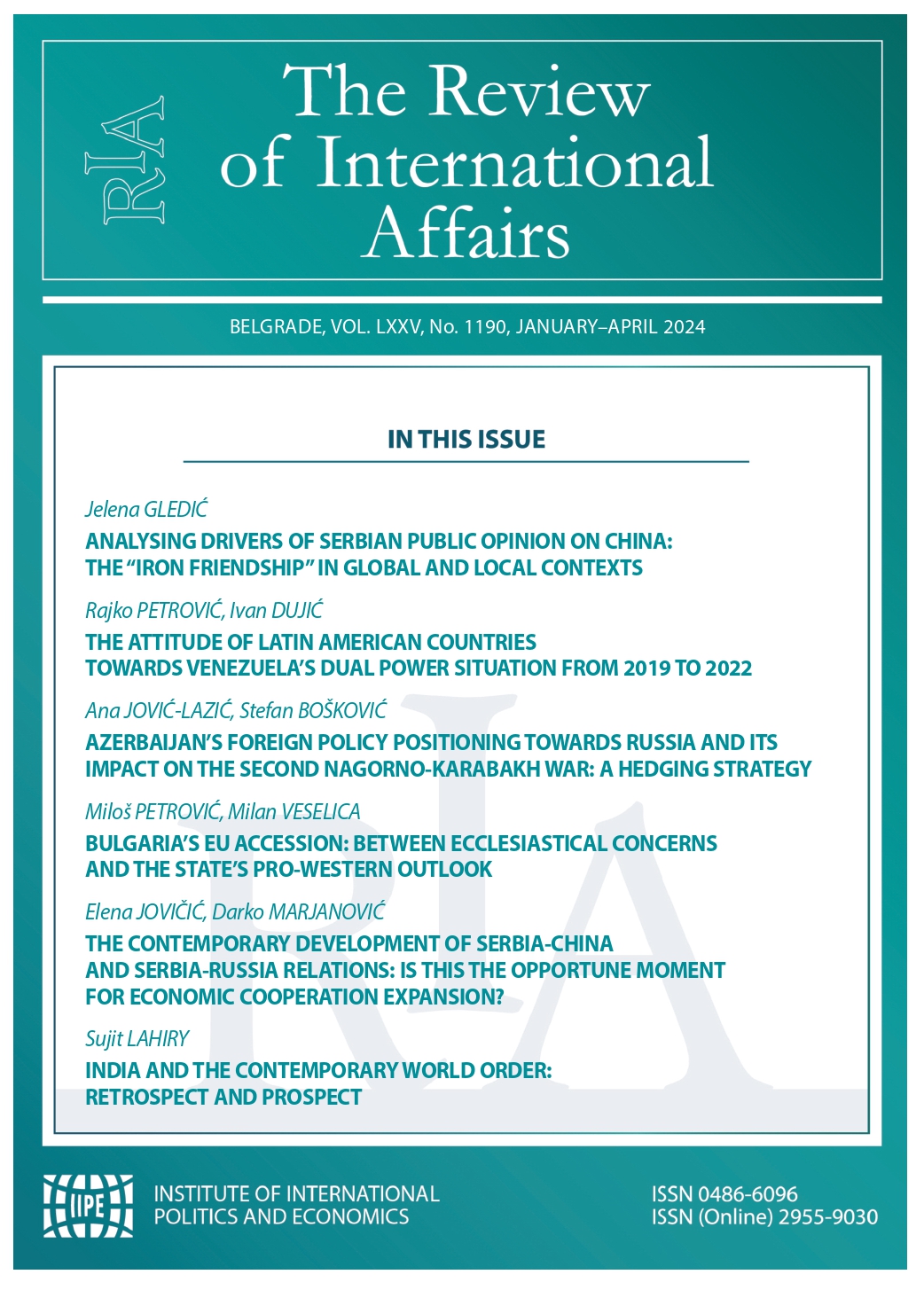
A theoretical framework rooted in hedging is used to analyse how Azerbaijan’s foreign policy towards Russia evolved and its significant impact on the Second Nagorno-Karabakh War. Azerbaijan’s foreign policy positioning, viewed through this prism, illustrates how smaller states can strategically manage relations with larger neighbours and competitors and achieve their interests. The primary hypothesis is that the calculated foreign policy of Azerbaijan’s strategy towards Russia, based on the abovementioned strategy, created the conditions for the Second Nagorno-Karabakh War and decisively influenced its course and outcome. Researchers use document analysis and discourse analysis to assess the evolution of Azerbaijan’s foreign policy towards Russia, analysing their bilateral relations based primarily on political, economic, and societal cooperation. This approach relies on various academic sources, including scientific articles, books, documents, agreements, and statements by different state actors, to assess the evolution of Azerbaijan’s foreign policy towards Russia, analysing their bilateral relations based primarily on political, economic, and societal cooperation. In this foreign policy context, the article also assesses the significance of Turkey’s strategic support for Azerbaijan and the strengthening of its military capacities. The research findings indicate that Baku, deviating from previous unilateral decisions, skillfully balanced its relations with Moscow. Azerbaijan’s foreign policy manoeuvring, which implies careful avoidance of provoking Russia, significantly impacted the outbreak, course, and outcome of the Second Nagorno-Karabakh Conflict.
More...
The purpose of the study was to construct a picture of the EU’s global position in a world defined by the US-Chinese technological Cold War. Morphological analysis has been used to enable a comprehensive analysis of the relationship between the technological and social domains. Structured interviews were also used to support the analytical process. The results of the exploration showed a picture of the EU’s multi-level technological weakness compared to competing powers. While the EU is not a weak entity, its future international position will depend on the creation of its own technological capabilities and on cooperation with the United States. Both lines of action are subject to multiple risks. Firstly, some aggressive technological developments (such as the plans to place microchips production in Europe) can generate more problems than diversification. Secondly, the EU must extend its work on high-tech (primarily AI) beyond the logic of market regulation and focus on their geopolitical and military dimension. It must also be ready for possible obstacles in cooperation with the United States. The alternative to this track, as the analysis shows, is the technological, and hence the political and economic peripheral status, where two technological superpowers – the United States and authoritarian China will compete. The most negative result for the EU is the status of “digital colony”. The paper aspires to be a part of the effort to fill the existing void in the scientific output of Polish social sciences, regarding exploration of the geopolitical dimension of technological progress, especially its impact on EU’s position in the new power distribution model, which will be the result of the rivalry between the US and China.
More...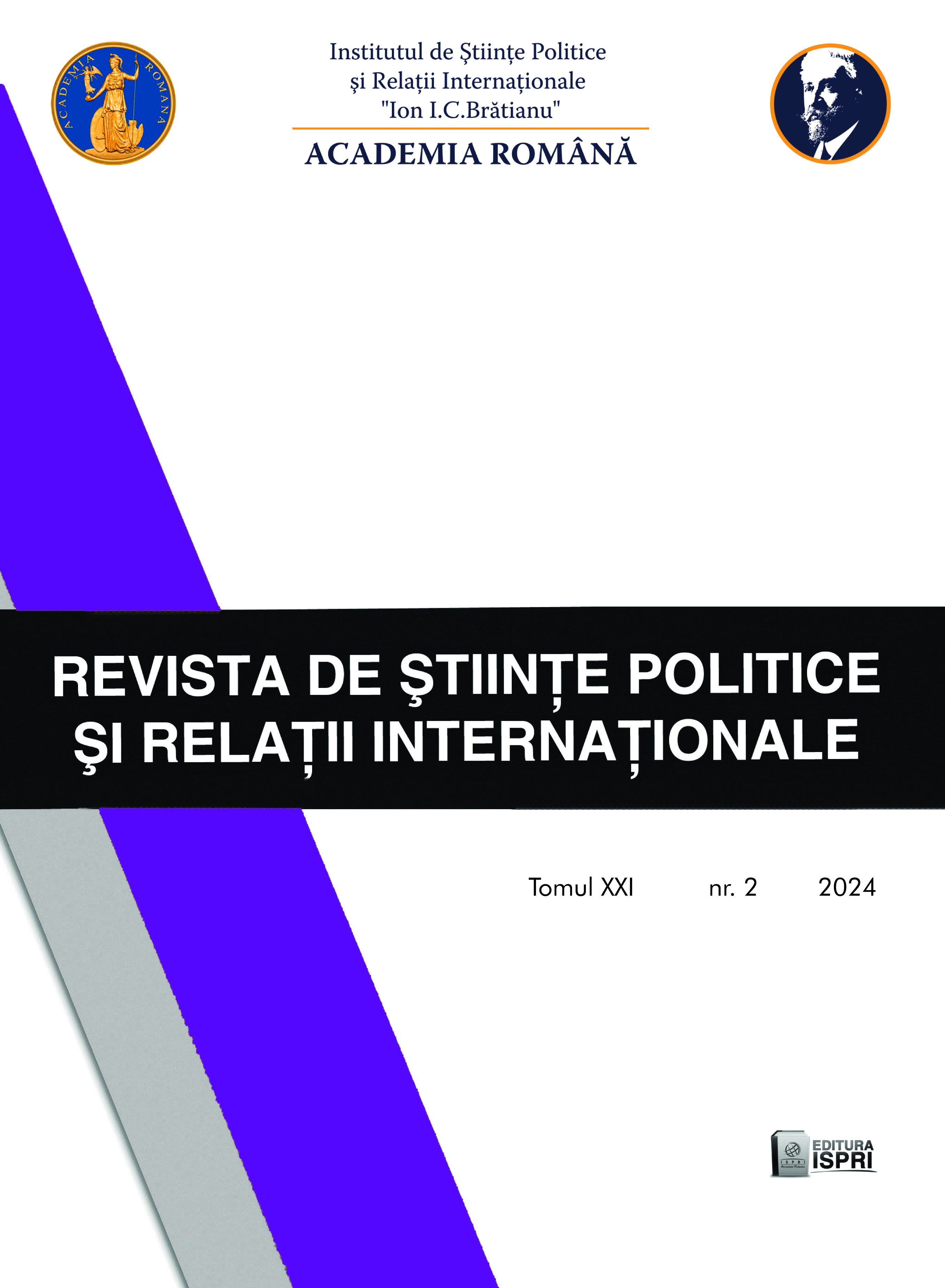
The war in Ukraine has multiple and significant consequences for the European security architecture, and at the EU level it has caused the worst post-Cold War security crisis. This article examines how the ongoing war between Ukraine and Russia has led the EU to take unprecedented decisions on its security, defense and enlargement. The purpose of this article is to identify the measures and actions taken by the EU to respond to the challenges of the war over the last two years and to assess its ability to withstand and respond to crises.
More...